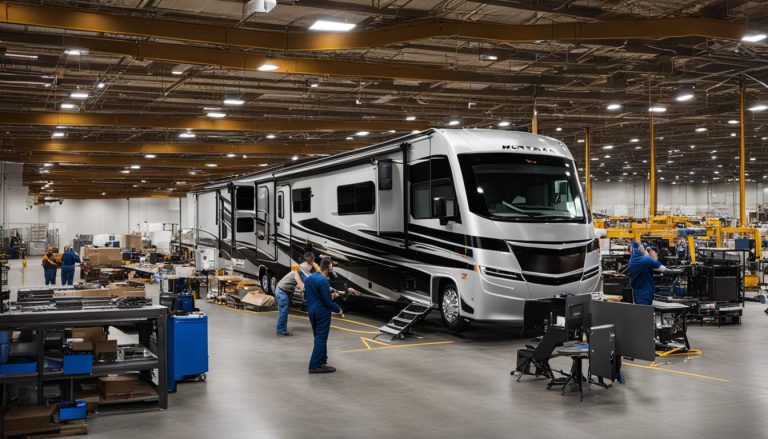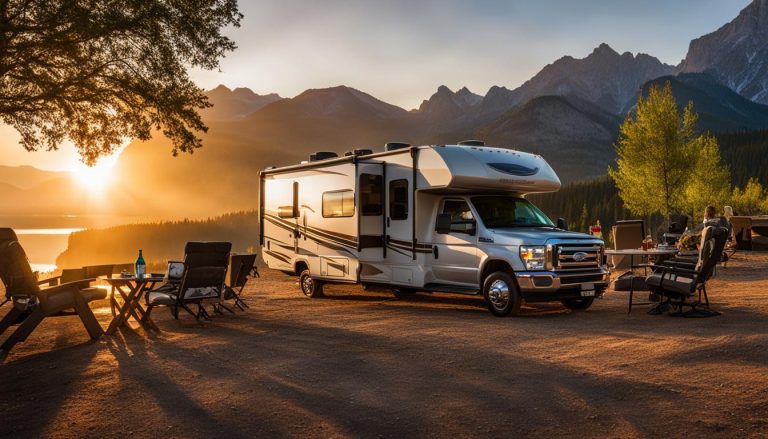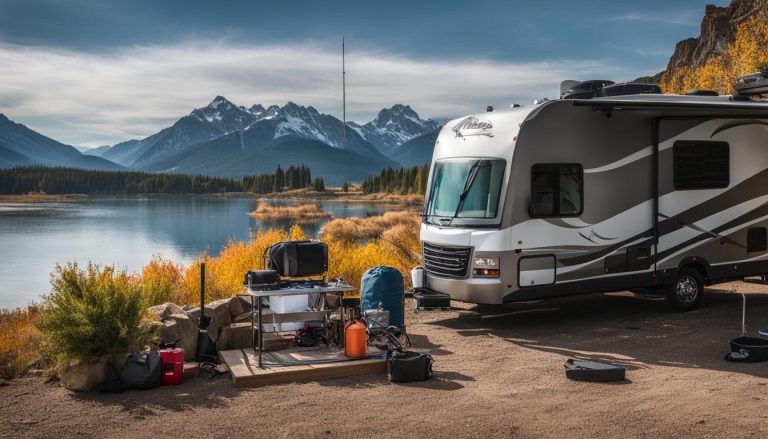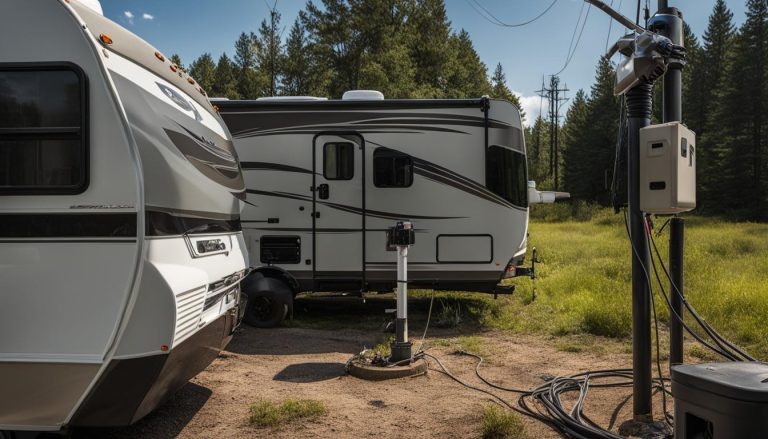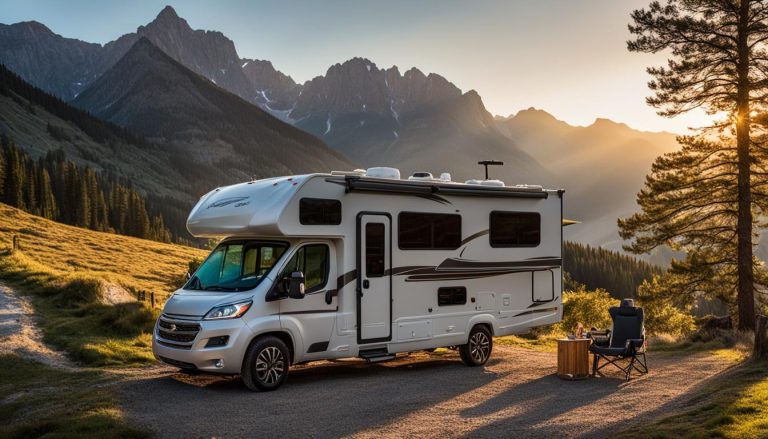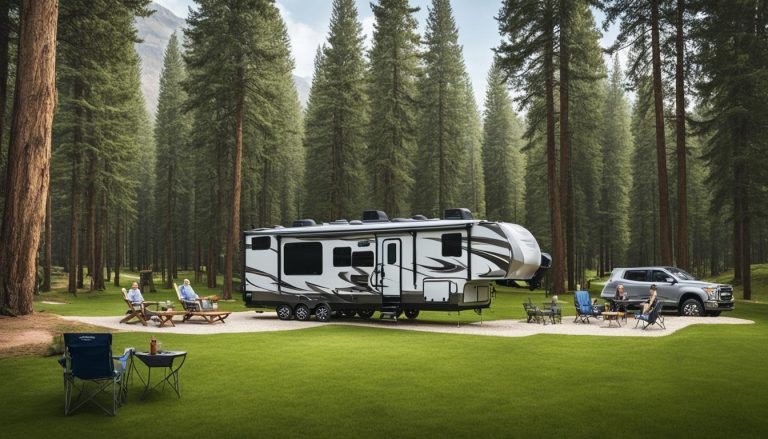Solve Your RV Fridge Issues: Quick Repair Guide
gorvlifestyle.com and its partners may earn a commission if you purchase a product through one of our links
If you’re experiencing problems with your RV fridge, you’re not alone. RV absorption refrigerators work differently than residential fridges, and troubleshooting them can be challenging. From food not staying at safe temperatures to the unit not turning on, there are various issues that can arise.
When your RV fridge isn’t working, it’s important to start with some basic troubleshooting tips. Checking the power sources, such as the coach battery, propane, and 120-volt AC, is the first step. Blown fuses, tripped circuit breakers, and faulty heating elements can often be the culprits. Additionally, ensuring proper airflow inside and outside the fridge and checking for leaks or ammonia sediment buildup is crucial.
If all your troubleshooting steps fail, it may be time to call an RV technician for further assistance. They have the knowledge and experience to diagnose and repair more complex issues with your RV fridge. Taking care of your RV fridge will help ensure it remains in good working condition and keeps your food fresh during your travels.
Key Takeaways:
- RV absorption refrigerators operate differently from residential fridges, and troubleshooting can be challenging.
- Basic troubleshooting steps include checking power sources, airflow, and looking for leaks or ammonia sediment buildup.
- If troubleshooting steps fail, it’s recommended to seek the assistance of an RV technician.
- Regular maintenance is essential for keeping your RV fridge in good working condition.
- Calling a professional for complex issues ensures your fridge is properly repaired and functioning optimally.
Understanding RV Fridges: How They Work
RV fridges are absorption refrigerators that operate on a combination of 12-volt DC power, propane, and 120-volt AC power. These unique fridges use a mixture of hydrogen gas, ammonia water, and sodium chromate to cool the unit, instead of a traditional compressor and refrigerant system.
To ensure your RV fridge functions properly and diagnose any problems it may encounter, it’s important to have a good understanding of how it works and how to troubleshoot common issues.
Power Sources
RV fridges rely on a combination of three power sources:
- 12-volt DC power: This power source is typically provided by the RV’s batteries and allows the fridge to run when the vehicle is not connected to external power.
- Propane: The propane supply is crucial for cooling the fridge when the vehicle is not connected to shore power or when the 12-volt DC power is insufficient.
- 120-volt AC power: This power source is used when the RV is connected to shore power at a campground or RV park.
Understanding how these power sources work and how to troubleshoot electrical and propane-related issues will help you keep your RV fridge running smoothly.
Regular Maintenance
Maintaining your RV fridge is vital for optimal performance. Here are some helpful maintenance tips:
- Keep the fridge clean: Regularly clean the interior and exterior of the fridge to prevent dirt and debris from affecting its efficiency. Pay attention to the door seals and ensure they are intact and clean.
- Use the appropriate power source: Use propane as the primary power source when traveling at high altitudes, as it performs better in these conditions. When connected to shore power, switch to 120-volt AC power.
By following these maintenance tips, you can prevent common problems and extend the lifespan of your RV fridge.
| Common RV Fridge Maintenance Tips |
|---|
| Keep the fridge clean |
| Check and clean door seals |
| Use the appropriate power source based on altitude |
Now that you have a better understanding of how RV fridges work and how to perform necessary maintenance, you’ll be better equipped to diagnose and fix any issues that may arise.
Troubleshooting Electrical Issues
If your RV fridge is not running on electricity, it’s time to troubleshoot the electrical system. There are a few potential culprits that could be causing this issue.
Checking the Power Sources
The first step is to check the 120-volt AC power source, as well as the heating element. Start by inspecting the fuses, circuit breakers, and the outlet for any signs of damage or malfunction. If any of these components are faulty, replace them accordingly.
Next, you’ll also want to test the 12-volt DC power source, especially if you have a three-way fridge. Ensure that the battery is properly connected and charged, and that all connections are secure. If the power sources are functioning properly and you’re still experiencing issues, it may be necessary to call an electrician or RV technician to further diagnose and repair the heating element.
Summary:
- If the fridge is not running on electricity, check the 120-volt AC power source and the heating element.
- Inspect the fuses, circuit breakers, and the outlet for any damage.
- Test the 12-volt DC power source for three-way fridges.
- If all power sources are working correctly, consider seeking professional assistance from an electrician or RV technician.
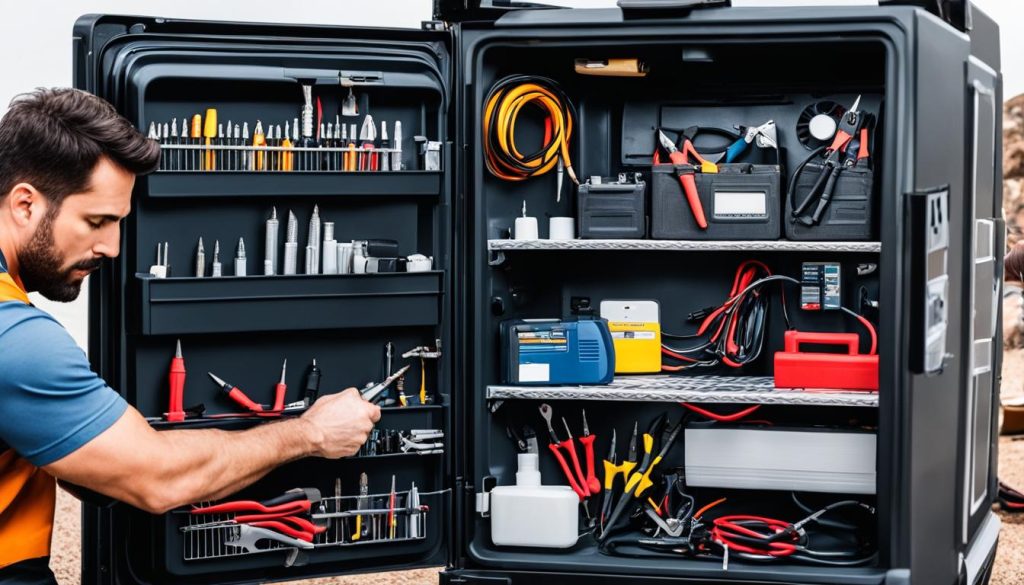
“If the fridge is not running on electricity, it may be due to issues with the power sources or the heating element. Checking and testing these components can help identify the problem, and if necessary, seek professional assistance.”
Troubleshooting Propane Issues
If you’re experiencing problems with your RV fridge running on propane, there are several steps you can take to troubleshoot and resolve the issue. Here’s a guide to help you fix your RV fridge and get it back up and running efficiently.
Check the Propane Level
First, ensure that your propane tank has an adequate amount of propane. Low propane levels can prevent the fridge from functioning properly. If the propane level is low, refill or replace the tank as needed.
Ensure the Service Valve is Open
Make sure that the service valve on the propane tank is fully open. A partially closed valve can restrict the flow of propane and prevent the fridge from igniting or staying lit.
Check for Propane Lockout Issues
Propane lockout can occur if there is an interruption in the propane supply or a safety feature has been triggered. To resolve this issue, turn off all propane-fueled appliances in your RV, wait a few minutes, and then try resetting the fridge.
Clean the Burner Assembly
If the burner fails to light or stay lit, it may be due to a dirty or clogged burner assembly. Cleaning the burner assembly can help restore proper propane flow and ignition. Follow the manufacturer’s instructions or consult an RV technician for guidance on cleaning the burner assembly safely.
Note: When working with propane, always follow proper safety precautions to prevent accidents or injuries. If you’re unsure about handling propane-related issues, it’s best to seek assistance from a qualified professional.
By troubleshooting the propane-related issues with your RV fridge, you can potentially resolve the problem and avoid costly repairs or replacements. However, if these troubleshooting steps do not solve the issue, it may be necessary to consult an RV technician for further assistance.
| Propane Troubleshooting Checklist |
|---|
| Check propane levels |
| Ensure service valve is open |
| Check for propane lockout issues |
| Clean the burner assembly |
Addressing Cooling Unit Leaks
If you notice an ammonia smell, gurgling sounds, or a yellow-green powder around the burner assembly of your RV fridge, it may indicate a leak in the cooling unit. Addressing cooling unit leaks promptly is crucial to prevent further damage to the unit and ensure proper cooling.
Why are cooling unit leaks a concern?
Cooling unit leaks can cause the fridge to malfunction and not cool your food properly, potentially leading to spoiled food and wasted groceries. If left unaddressed, leaks can also result in more extensive damage to the cooling unit, requiring expensive repairs or even fridge replacement.
What should you do if there is a cooling unit leak?
If you suspect a cooling unit leak in your RV fridge, it’s best to seek professional help from an experienced RV technician. They have the knowledge and tools to diagnose the issue accurately and replace the cooling coils if necessary.
To find an RV technician in your area, you can consult your RV manufacturer’s customer support or search for authorized RV service centers. It’s important to choose a reputable technician who specializes in RV fridge repair and has experience working with various fridge models.
Common signs of cooling unit leaks:
- Ammonia smell
- Gurgling sounds
- Yellow-green powder around the burner assembly
Preventing cooling unit leaks:
While some cooling unit leaks may occur due to natural wear and tear, there are steps you can take to minimize the risk of leaks in your RV fridge:
- Regularly inspect your fridge for any signs of leaks, such as strange odors or unusual sounds.
- Maintain proper airflow around the fridge by keeping the vents clean and clear of obstructions.
- Ensure the fridge is leveled to prevent excess stress on the cooling unit.
- Follow the manufacturer’s guidelines for operating and maintaining your RV fridge.
By taking these preventive measures and addressing cooling unit leaks promptly, you can extend the lifespan of your RV fridge and enjoy worry-free travels.
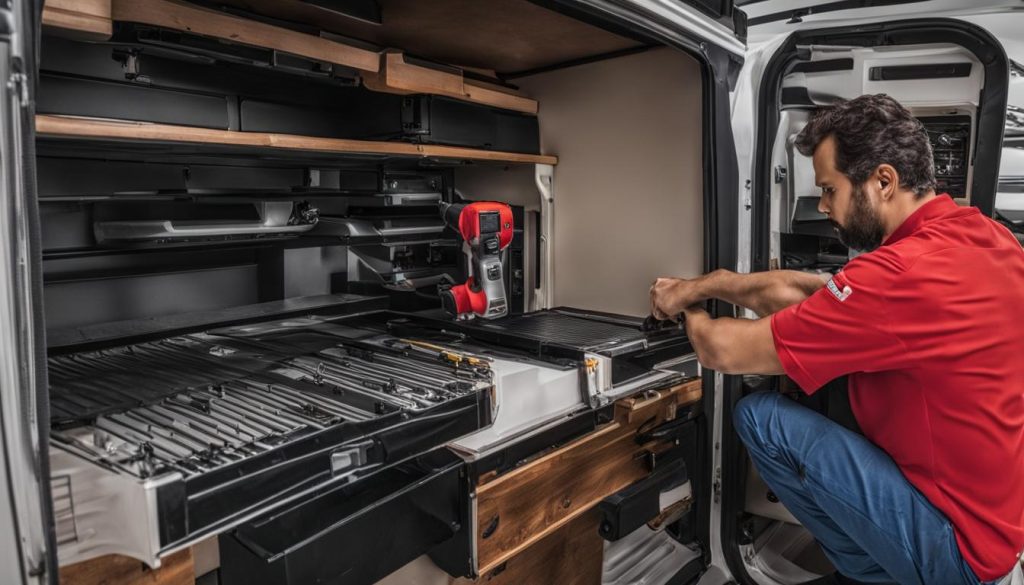
Dealing with Ammonia Sediment Buildup
One common issue that RV owners may encounter with their fridge is ammonia sediment buildup. This can occur when the fridge is not used for extended periods of time, such as during the off-season or when the RV is in storage. When this buildup occurs, it can lead to inadequate cooling and affect the overall performance of the fridge.
If you notice that your RV fridge is not cooling properly and suspect ammonia sediment buildup, there is a potential solution that you can try. You can turn the fridge upside down for a short period of time to allow the sediment to move away from the cooling unit. This can help dislodge and redistribute the sediment, potentially improving the cooling efficiency of the refrigerator.
Please note: turning the fridge upside down is a temporary fix and may not completely resolve the issue. It is ultimately recommended to replace the refrigerator if the problem persists, as ammonia sediment buildup can be indicative of internal damage or components wearing out.
Troubleshooting Common Issues
Even with proper maintenance, RV fridges can still experience common issues that may disrupt their performance. Here are some troubleshooting tips to address these problems:
Frozen Cooling Units
If your RV fridge is not cooling properly and the cooling unit is frozen, extreme temperatures may be the culprit. To thaw the unit, try using a lightbulb or space heater to warm it slowly. Be cautious not to expose the unit to excessive heat, as this can cause damage.
Faulty Burners
A faulty burner can lead to inconsistent cooling or no cooling at all in your RV fridge. One possible cause of a faulty burner is excess air in the gas supply lines. To resolve this issue, reset the fridge and purge the propane cylinders. Follow the manufacturer’s instructions for safety and proper reset procedures.
Food Not Staying Cold
If your food is not staying cold in the RV fridge, it could be due to various reasons. Start by ensuring that the fridge is set to the correct temperature and that the door seals are intact. Check for any obstructions that might affect proper airflow inside the fridge. Additionally, verify that the fridge is not overloaded with items, as this can impede proper cooling.
If you’ve exhausted all the troubleshooting steps above and the issue persists, it may be time to consult an RV technician for further assistance.
Note: Regular maintenance, such as cleaning the fridge, checking seals, and ensuring proper airflow, can help prevent these common RV fridge issues.
Now that we’ve discussed the common issues with RV fridges, let’s explore the importance of regular maintenance and knowing when to seek professional help.
| Common Issue | Troubleshooting Steps |
|---|---|
| Frozen Cooling Units | Thaw slowly with a lightbulb or space heater |
| Faulty Burners | Reset the fridge and purge propane cylinders |
| Food Not Staying Cold | Check temperature settings, door seals, and airflow; avoid overloading |
Conclusion: Regular Maintenance and Professional Help
When it comes to keeping your RV fridge in top shape, regular maintenance is key. By following a few simple tips, you can prevent and address common issues that may arise. Firstly, make sure to clean your fridge regularly, removing any spills or debris that may hinder its performance. Check the seals around the fridge door to ensure they are tight and free from cracks or damage. This will help maintain proper temperature and prevent wastage of energy. Another important aspect is to ensure proper airflow in and around the fridge. Clear any obstructions from the vents and make sure the fridge is not cramped with items, as this can impact its cooling efficiency.
While regular maintenance can address most issues, there are some problems that may require professional help. Electrical or complex mechanical problems, for instance, are best left to experienced RV technicians who have the necessary expertise to tackle them. So, if after performing the troubleshooting steps and DIY repairs, the fridge is still not functioning properly, it’s time to call in the experts.
By recognizing when professional assistance is needed, you can ensure that your RV fridge is properly repaired and functioning optimally for your future journeys. So, remember to schedule routine maintenance and don’t hesitate to seek professional help when necessary. Taking care of your RV fridge will not only provide convenience and peace of mind during your travels but also extend its lifespan, saving you time, money, and potential headaches along the way.
FAQ
How can I fix my RV fridge?
To fix your RV fridge, start by checking the power sources such as the coach battery, propane, and 120-volt AC. If there are any blown fuses, tripped circuit breakers, or faulty heating elements, replace them. Ensure proper airflow inside and outside the fridge and check for leaks or ammonia sediment buildup. If all troubleshooting steps fail, it’s recommended to call an RV technician for further assistance.
How do RV absorption refrigerators work?
RV absorption refrigerators operate on a combination of 12-volt DC power, propane, and 120-volt AC power without a compressor or refrigerant. They use a mixture of hydrogen gas, ammonia water, and sodium chromate to cool the unit. Understanding the different power sources and troubleshooting electrical and propane-related issues is important to maintain the fridge’s functionality.
What should I do if my RV fridge is not running on electricity?
If your RV fridge is not running on electricity, check the fuses, circuit breakers, and outlet for any issues. Test the 12-volt DC power source for three-way fridges. If these power sources are working properly, it may be necessary to call an electrician or RV technician to check the heating element.
What should I do if my RV fridge is not running on propane?
If your RV fridge is not running on propane, check the propane level, ensure the service valve is open, and look for any propane lockout issues. Turn off all propane-fueled appliances, wait a few minutes, and try resetting the fridge. If the burner does not light or stay lit, cleaning the burner assembly may be necessary. Remember to follow safety precautions when working with propane.
How do I know if there is a leak in the cooling unit?
A leak in the cooling unit may be indicated by an ammonia smell, gurgling sounds, or a yellow-green powder around the burner assembly. In this case, it’s best to call an RV technician to replace the cooling coils. Addressing leaks promptly is important to prevent inadequate cooling and potential damage to the fridge.
How can I deal with ammonia sediment buildup in my RV fridge?
Ammonia sediment buildup can occur when the fridge is not used for extended periods. One temporary solution is to turn the fridge upside down for a short time to allow the sediment to move away from the cooling unit. However, if the issue persists, it’s recommended to replace the refrigerator.
What are some other common issues with RV fridges?
Other common issues with RV fridges include frozen cooling units, faulty burners, and food not staying cold. Thawing frozen cooling units slowly with a lightbulb or space heater can help. Faulty burners may be caused by excess air in the gas supply lines, which can be resolved by resetting the fridge and purging the propane cylinders. If troubleshooting steps don’t work, consulting an RV technician may be necessary.
How can I prevent and address common RV fridge issues?
Regular maintenance is important to prevent and address common RV fridge issues. This includes cleaning the fridge, checking seals, ensuring proper airflow inside and outside the fridge, and using the appropriate power source based on altitude. However, for complex electrical or mechanical problems, it’s recommended to seek professional help from an RV technician.

